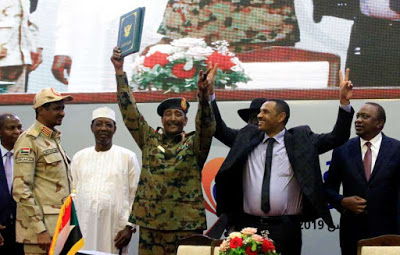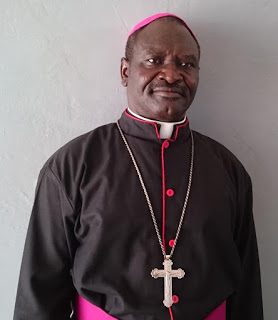SUDAN: Catholic Bishop of El Obeid Relives the Country’s Experience Over the Past Nine Months.

Leaders celebrates after the signing of Power Sharing Deal for a joint Military and Civilian Sovereign Council (Image Courtesy)
Saturday August 17 will remain memorable in the minds and hearts of Sudanese People following the signing of a final power-sharing agreement between civilian led pro-democracy movement and the ruling military council that has been in charge of the country since April this when President Omar al-Bashir was ousted. The country has witnessed internal conflict resulting to dozens of people being killed during street protests.
The signing of the deal paves way for a transition to civilian-led government which is anticipated to happen after three years. It has also created a joint military and civilian sovereign council to rule for the three years until elections can be held. On Wednesday, August 21, the country witnessed the swearing in of Sudan’s new sovereign council which is composed of eleven members – five military officers and five civilian figures, as well as a judicial figure chosen by both the army and opposition.
Sudan has since December 2018, witnessed a number of phenomena, some of which can be termed triumphant for the people and others quite ugly where lives have been lost.
Following the agreement, a military leader will head the 11-member council for the first 21 months, then a civilian leader will take over for the next 18. The agreement also establishes a Cabinet appointed by the activists, as well as a legislative body to be assembled within three months. The protest coalition is to have a majority in that body, as nominated by the Forces for Declaration of Freedom and Change, a coalition of opposition parties and movements representing the protesters.
Bishop of the Catholic Diocese of El Obeid Rt. Rev. Yunan Tombe Trille Kuku Andali in an article he sent to AMECEA Online news shortly before the signing of the power-sharing deal, illustrates the events that the country has experienced.
The country Lost Track Towards a Civilian Government!
By Rt. Rev. Tombe Trille- Bishop of El Obeid

The 19 December 2018 Sudan witnessed peaceful and gentle revolution, in opposition to the rising prices of the basic goods including bread. The protests grew quickly and found support from different opposition parties. Youth and women’s movements were observed to be the majority in the frontline.
They shouted against the ruling government of Omer whom they ousted from presidency on 11 April 2019, after 30 years of ruling. Their slogans were simply: Freedom, Peace, Justice. That change, though replaced by another military Junta, the protestors jubilantly received the news with hope a new child was born at last! Of course some people experienced of history of changes of military replacements in our country, cautiously received it while waited to hear further announcements about what is new anyway!
The experience in the history of our country military’s changes proved right being cautious, the military sooner, spoke out of being protectors and sharers in the revolutions and they are to remain. Mistrusts with the Forces of Freedom and Change (FFC) were publicly uttered. The Military Junta began issuing decrees proving themselves being in power. Words of contradictions and denials were spoken out plainly. To show their custodianship, the announcements of attempted coups followed one after another and injected distress in all people thinking wearily on the fate that awaited what comes next.
Following the daily unfolding events of words and actions, as a civilian in the midst of all these military and political pan-aroma, I got lost and confused. There are great confusions. We see and feel those political and military advanced in the game of power and ruling are trickily taking us back to status quo. Indeed, one thinks, sees new faces, hears new voices and languages, but actions are the same as of those whom they ousted. The demand of civilian government is not acceptable by the military, who demonstrated desire to continue ruling.
It provoked the events of 3 June 2019, which landed on peaceful sleeping Sudanese people: killing, raping took place, and hundreds were injured in Khartoum in the heart and before the eyes of the ruling leaders and foreign diplomats. The junta’s security forces did what they were used to for years. And yet nobody claimed responsibility!
On 29 July Schools’ Children in El Obeid town protested on the stoppage of public transport due to fuel shortages, drinking water outages, increasing commodity prices, and the unavailability of bread. The response of the Military Council security forces was shooting live ammunition at them, killing four students while many were wounded. The living ones have their future stagnant as the schools are suspended indefinitely.
Currently, the political and constitutional arrangements warped the attention of the ruling Military Council and association of forces of change forgetting other important issue of the daily life of the people. The initial cause of the uprising, the basic needs, the prices of the commodities remain untouched; the standard of daily life of the people is hard to bear.
Statements on peace were not part of new change as it was never uttered by any of members of Transitional Military Council. It was mentioned only later on when it seemed an issue among the youth from marginalised war zone participating in revolution movements. War is partly the cause of economic crises. Thinking in this line, peace has not received its fitting weight.
The Constitutional Declaration signed by the Transitional Military Council and Forces of Freedom and Change on 4 August 2019, ensures that six civilians and five military officials will lead the Sudan government during the three-year transition period. The Forces of Freedom and Change are trying to gather scattered dissatisfied groups, while the Military and their security forces are now at rest and settled as they have made it again. The winner is the Transitional Military Council. All army forces remain as they were with means of gripping to power, but with some changes of names and directors leading them.
The situation is too fragile, the future is very unclear, this is still the country of coups and anything can happen here. The country is back to its rulers and the revolutions have lost the track. The 30 years of Islamist ruling had indeed, empowered a number of civil servants in all institutions but the numberless wings of army forces and different Islamist militants are at work.
There is no space left to accommodate or focus on the Christians or the other minorities’ issues in the society. The international community can help but it knows a little of the root cause of the problems. In a political system that speaks angelic diplomatic languages and act their own ways as independent nations with sovereignty, the minorities will always suffer as nations put the interest of the majority first!
∽End∽
By Pamela Adinda, AMECEA Online News


